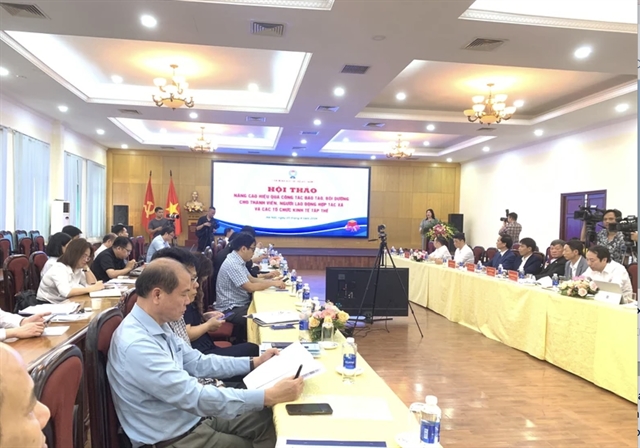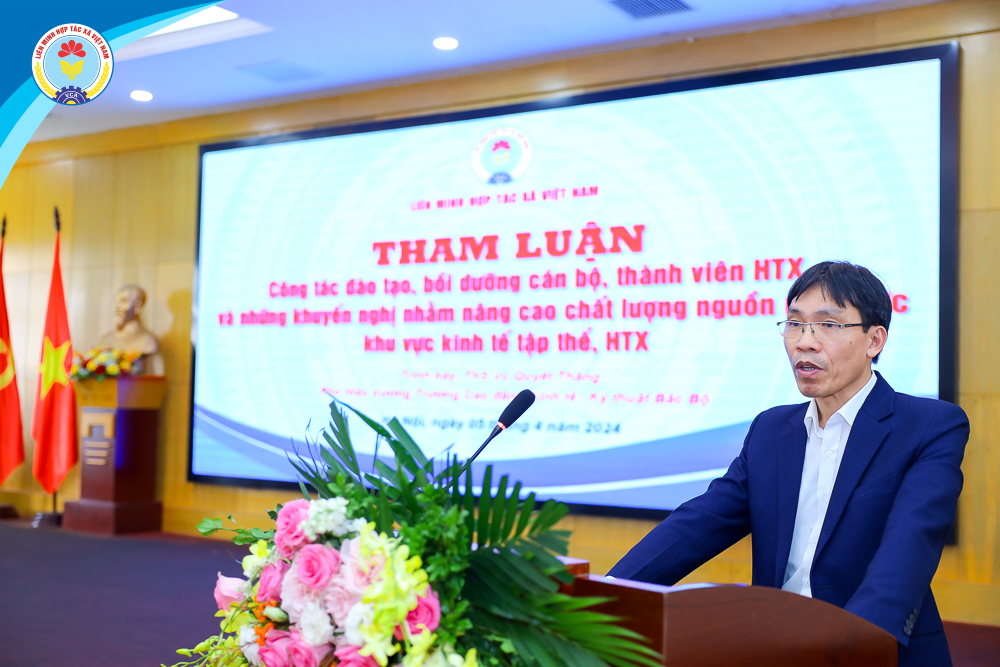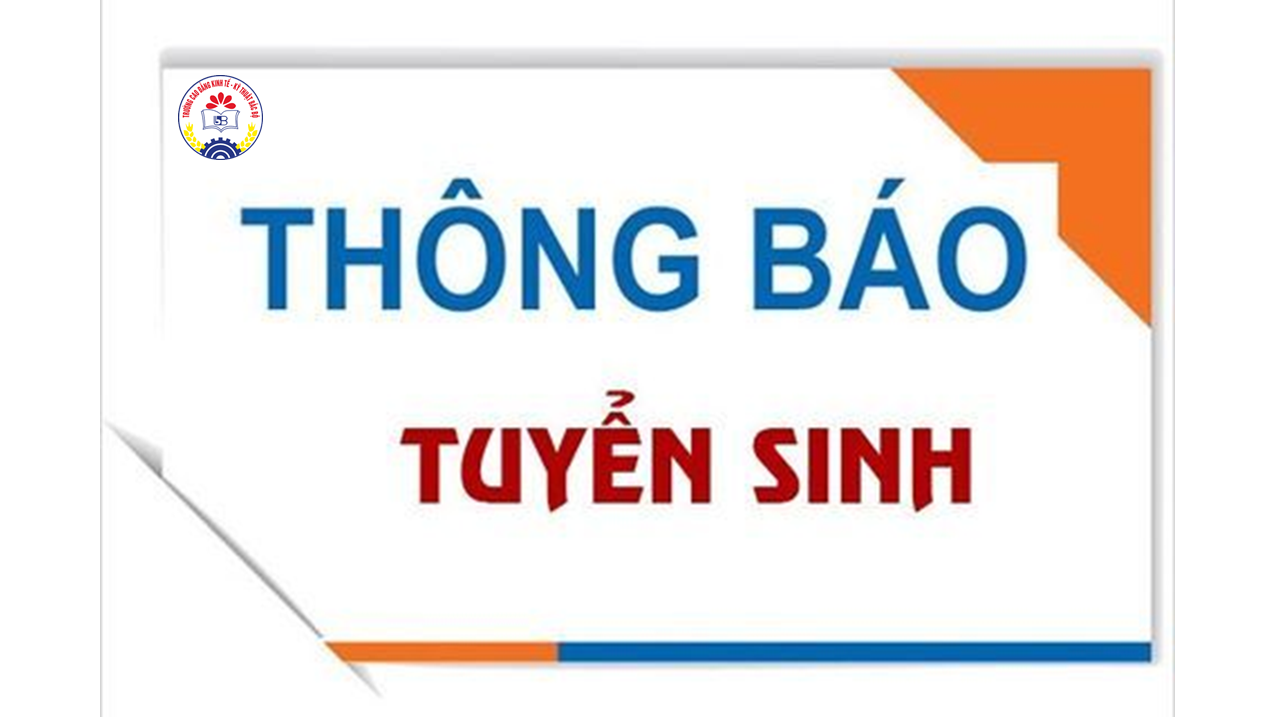Vocational training for rural workers associated with the establishment of co-operative groups and cooperatives is one of the important contents stipulated in the Vocational Training Project for Rural Workers.
 |
| Workshop on improving training quality for members and workers of co-operatives and collective economic organisations held by the Việt Nam Co-operative Alliance in Hà Nội. VNA Photo Tố Như |
HÀ NỘI – Many co-operatives, currently, are not operating effectively and face difficulties in applying technology and meeting the increasing market demands, said Cao Xuân Thu Vân, president of the Việt Nam Co-operative Alliance (VCA).
“This is because co-operatives’ human resources are not guaranteed in quantity and quality,” Vân said in a workshop on improving the quality of training for members and workers of co-operatives and collective economic organisations.
“Co-operatives play a very important role in training human resources to help develop ecological agriculture, modern rural areas and farmers, thereby promoting the linkage of agriculture, rural areas and farmers,” she said.
According to data from the Ministry of Agriculture and Rural Development (MARD), among the total 72,359 agricultural co-operative management staff nation-wide, up to 44 per cent have not been trained and only 16 per cent have college, university or post-graduate degrees.
Notably, 32 per cent of co-operatives directors have not been trained. This figure in the Mekong Delta is up to 57.3 per cent and in Tây Nguyên (the Central Highlands) region is 44.6 per cent.
This is an on-going concern for many co-operatives.
In fact, vocational training for rural workers associated with the establishment of co-operative groups and cooperatives is one of the important contents stipulated in the Vocational Training Project for Rural Workers.
Statistics from the General Department of Vocational Education (Ministry of Labour, Invalids and Social Affairs - MoLISA) showed that in 11 years of implementing the vocational training project for rural workers, 61,217 people after getting vocational training have established production groups, co-operatives and small-scale enterprises.
On average, every year, 5,565 people after vocational training have set up co-operative production groups, co-operatives and enterprises to create jobs for themselves and other local workers.
However, only 2 per cent of people getting vocational training establish co-operatives and enterprises.
Đào Trọng Độ, director of MoLISA’s Regular Training Department, said that currently, many localities cannot mobilise active artisans to participate in training and imparting vocational skills to co-operatives’ workers.
This may be because artisans wanted to keep their craft a secret to pass on within their families, said Độ.
But it is also due to the policy being inappropriate and cumbersome, he added.
Currently, the three national target programmes of building new rural areas, reducing poverty, and developing ethnic minority areas all have projects and sub-projects on training rural labour resources, of which there are cooperatives.
In fact, many localities have not used all the support resources for training rural and co-operative workers, but co-operatives remain short of trained and qualified workers, Độ said.
This requires detailed statistical review to reach a satisfactory solution.
The VCA’s president said that ministries and sectors also have programmes to train human resources for co-operatives, but the programmes operate separately, diminishing their effectiveness.
In particular, the co-operative management position and accounting team have not been paid attention to training.
Lê Văn Việt, CEO of Xuyên Việt Co-operative in Hải Dương Province, said that attracting high-quality human resources for many cooperatives is difficult because of their small scale, and high-quality human resources say that co-operatives are not their destination.
This is the problem for cooperatives, he said.
Co-operatives need to have methodical and professional production models, capable of developing and bringing value to members, Việt said.
He shared the experience of Xuyên Việt Co-operative, which for many years co-ordinated with schools to take on capable students as interns, pay their tuition fees and then recruit them.
With commitment, knowledgeable young people are very excited to work, contribute and join the cooperative, he said.
Currently, the co-operative attracts many talented people from large corporations to work. To do so, co-operatives also need to be transparent about their finances and production and business activities, he added.
Human resource training for co-operatives is extremely important, to help co-operatives overcome difficulties and develop effectively. VNS
Nguồn: vietnamnews.vn
Chia sẻ bài viết:
Thông báo tuyển sinh |
Chương trình đào tạo |
 |
Quy chế tuyển sinh |
 |
Phiếu đăng ký học |
 |
Hướng dẫn nhập học |
 |
Học phí |
 |
Câu hỏi thường gặp |
 |
 THÔNG BÁO TUYỂN SINH NĂM 2020
THÔNG BÁO TUYỂN SINH NĂM 2020
 Trường Cao đẳng Kinh tế – Kỹ thuật Bắc Bộ tiếp tục phối hợp tổ chức tập huấn nâng cao năng lực tiêu thụ nông sản và thương mại điện tử cho vùng DTTS&MN tỉnh Quảng Trị
Trường Cao đẳng Kinh tế – Kỹ thuật Bắc Bộ tiếp tục phối hợp tổ chức tập huấn nâng cao năng lực tiêu thụ nông sản và thương mại điện tử cho vùng DTTS&MN tỉnh Quảng Trị
 THỰC TRẠNG VÀ GIẢI PHÁP NÂNG CAO CHẤT LƯỢNG ĐÀO TẠO, BỒI DƯỠNG NGUỒN NHÂN LỰC CHO KHU VỰC KINH TẾ TẬP THỂ, HỢP TÁC XÃ GIAI ĐOẠN 2025 - 2030, TẦM NHÌN ĐẾN NĂM 2045
THỰC TRẠNG VÀ GIẢI PHÁP NÂNG CAO CHẤT LƯỢNG ĐÀO TẠO, BỒI DƯỠNG NGUỒN NHÂN LỰC CHO KHU VỰC KINH TẾ TẬP THỂ, HỢP TÁC XÃ GIAI ĐOẠN 2025 - 2030, TẦM NHÌN ĐẾN NĂM 2045
 Thông báo Tuyển sinh Bộ đội xuất ngũ năm 2026
Thông báo Tuyển sinh Bộ đội xuất ngũ năm 2026